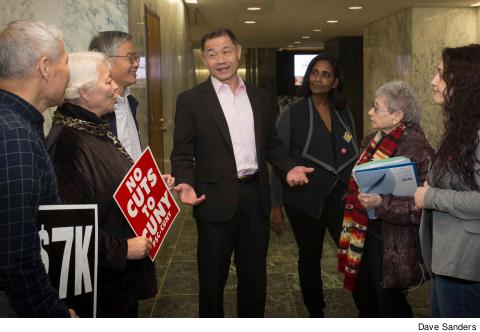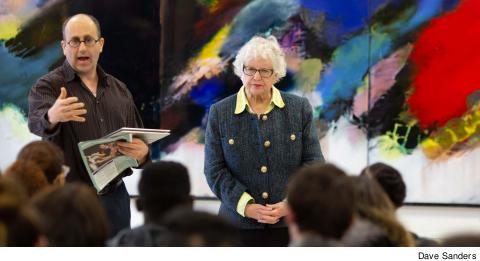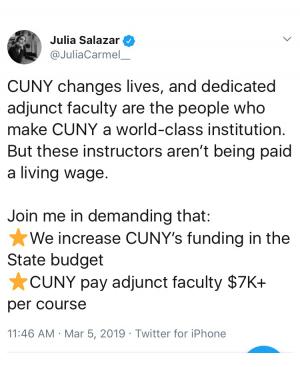Reframing the Albany debate about CUNY
 |
As this newspaper went to press, the state government was concluding final negotiations to produce its spending plan for next year. Both the Assembly and Senate, now led by a Democratic majority, included modest increases for CUNY in their “one-house” bills that positioned them for final negotiations with Governor Cuomo. These increases included operating funding for the “TAP Gap,” which cuts financial aid revenue available to CUNY by $74 million this year. However, at press time, it appeared that Governor Cuomo’s resistance to raising taxes and general concern about the federal tax cuts on state tax revenues will limit increased spending for services across the board – including for CUNY. If this proves to be the case, the PSC will continue to press for funding from New York City and other sources to fund the next PSC contract or address the systematic and historic underfunding of CUNY by the state.
FUNDING NEEDS
The budget deal comes after a serious lobbying campaign by the PSC. While the immediate focus of PSC lobbying efforts is the next contract, the union’s effort is part of a broader, long-term campaign to increase revenue from the state for public higher education. Increased revenue would enable CUNY to address college funding deficits, full-time salary needs and the wages and working conditions of part-time adjunct faculty. The state has a long-term obligation, the union argues, to ensure the viability of CUNY as both a research and teaching university. As a national leader in enabling students to move out of poverty, CUNY is essential to the state’s economic future. But it should also be supported as a major employer, which should offer secure jobs and good pay. Given the current level of adjunctification of CUNY’s teaching faculty, the state’s current funding model hardly lives up to that ideal.
PSC’s argument for increased funding for CUNY has several components:
- Funding to cover the “TAP Gap,” which requires CUNY to fund all or part of the difference between students’ TAP awards and tuition at senior colleges. This amounts to a revenue loss of $74 million this year, and will grow to $86 million next year;
- Wage equity for teaching adjuncts – an increase to $7,000 per course to establish fair pay;
- New full-time faculty lines and additional lines for advisors and counselors;
- Funds to address mandatory operating cost increases and adequate capital investment to cover critical building maintenance and new facilities.
On February 12, 55 PSC members – full-time and adjunct faculty, HEOs and CLTS – traveled from New York City to Albany to meet with state lawmakers and their staffs to press the need for funding for public higher education, hammering home that CUNY cannot continue to be financed through tuition increases and a growing dependence on low-paid adjuncts to teach a majority of courses. A smaller group participated in the NYSUT Committee of 100 in early March.
 |
At home in New York City during March, the union and campus chapters organized 13 in-district meetings in local offices with state lawmakers or their staffs. Members testified at borough-wide “budget townhall” meetings in Manhattan and Queens. PSC leaders from the three Bronx campuses – Lehman College, Bronx Community College and Hostos Community College – held a press conference on March 22 demanding that Bronx lawmakers work to increase funding for CUNY citing the benefits the university provides for the borough. Toby Ann Stavisky, the State Senate Higher Education Chair, addressed questions from faculty and staff during a meeting at Queens College, which is in her district.
“In each meeting, we explained how years of inadequate funding from New York State have put CUNY in a state of perpetual crisis: too few full-time faculty positions, too much reliance on a model of low-paid contingent labor that is bad for educators and students alike, overburdened professional staff, strained services, crumbling buildings,” said Geoff Kurtz, a political scientist and the PSC chapter chair at Borough of Manhattan Community College, on his experience on lobby day. “We pointed out that CUNY needs a massive increase in state aid to senior colleges [and] a lift in per-student aid to community colleges. It’s a tough ask,” Kurtz said, noting that lawmakers, even if sympathetic to the PSC’s demands, are still wary about confronting the prickly and reputedly vindictive Cuomo. But he noted two insights from lobbying that surprised him.
“First, everyone we spoke with knew that CUNY is an important public good, that CUNY needs public support and that the PSC is the crucial voice for CUNY in New York politics. The details we conveyed – the urgency of raising adjunct pay, especially – were new to some. But years of PSC advocacy have raised awareness of the situation at CUNY and have put the PSC itself on the political map,” Kurtz said. “Second, although they saw the PSC’s aims as ambitious – no one we spoke with thought that we were making a mistake by pushing harder than ever for increased CUNY funding this year. There’s a new Democratic/Working Families majority in the New York Senate. A door has opened: changes that would surely have been blocked in recent years now stand a chance of enactment.”
RECEPTIVE LAWMAKERS
 |
Rebecca Smart, an adjunct instructor in psychology at Baruch College and at Borough of Manhattan Community College, attended the lobby day. She said all of the lawmakers she met with, both in Albany and at in-district meetings – including State Senators Andrew Gounardes of Brooklyn, Julia Salazar of Brooklyn and Assembly Member Yuh-Line Niou, whose district includes BMCC – agreed with the PSC’s demands, but they noted that it was going to be an uphill negotiation with the governor.
Smart noted that many lawmakers had been aware of CUNY’s low pay for adjuncts and the need bring adjunct salaries in line with salaries at peer institutions, but that it was “good to reiterate it” and that lawmakers were moved by adjuncts’ personal testimonies of struggle with poverty wages.
In the fight for a good contract, the next steps for the union go beyond state lawmakers – the union is pressuring the mayor, governor and the CUNY administration to come to a contract agreement that grants raises for all, addresses equity needs and non-economic needs, and lifts adjuncts out of poverty wages. But the direct campaign toward lawmakers will continue for the long haul. Activists have said that they are looking to propose new revenue generating new taxes on the wealthy or a stock buyback tax to fund critical public goods like CUNY.

